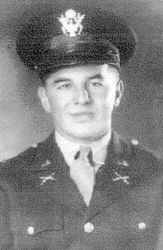14 June 1944 was certainly a difficult day for the men of the 9th Infantry Division. The ‘Devils’ of the 60th Infantry Regiment were to experience their first taste of fire on the European continent. A number of them were veterans of North Africa and Sicily, but many were replacements who had arrived a few weeks before D-Day, straight out from Basic Training.
The division’s mission was to cut the Cotentin Peninsula from east to west, reach the west coast to split the German forces and isolate the fortress of Cherbourg and its occupants from their supply lines.
The 60th Infantry Regiment was chosen to start the westward offensive. The infantry assembled on 13 June near Picauville at about 4 pm. The rifle companies were ready on the line of departure, ready to launch the assault the next morning.
The objective of the day was the village of Orglandes. It was 5 a.m. on 14 June when the regiment set off for its first engagement since the Sicilian campaign in August 1943. The progression was organised by battalion: the 3rd, followed by the 1st and 2nd. The line of departure was crossed at 10 a.m.

Abstract of the map X « Securing the Douve Line », in RUPPENTHAL R., Utah Beach to Cherbourg (6 June-27 June 1944), Center of Military History, Washington D.C., 1948
The leading elements were quickly targeted by snipers from the hedgerows on both sides of the track they took. The advance slowed down and the Germans fired mortars and artillery on the axes used by the 3rd Battalion. Nearby, elements of the 90th Infantry Division were also pinned down.
The whole regiment was slowed down by German resistance. In the afternoon, the 2nd Battalion, then in reserve at the rear, was activated to resume the assault in front. The infantrymen of the 2nd Battalion were sent forward, went through the lines of the 1st Battalion and took position in place of the 3rd Battalion. The approach was made in such a way that the companies progressed along both sides of the roads to the junctions and crossroads with the main road, and then the infantrymen deployed there and took up defensive positions along the main road to Orglandes.

Fist Lieutenant Joseph L. Rappazini
In the 3rd Battalion sector, K Company stumbled upon a hundred German soldiers resting in a field. Lieutenant Joseph L. Rappazini and his platoon were in the forefront of the position, and ordered his men not to open fire. He got up and presented himself to the Germans. He indicates that he is unarmed, while the Germans seem so surprised that they do not even react.
Rappazini then asked if anyone spoke English, and a German volunteered to translate. The two protagonists sit down against a hedge and talk. Rappazini explains how it was futile to fight. They are surrounded and outnumbered. He tells him that the Americans, in a hurry, are sending the German prisoners to the rear without much security.
He then tells of a lieutenant who unintentionally captured a group of German soldiers as he tried to join his tank unit. But they were moving so fast that he could not catch them. The Germans, stunned by this information, immediately surrendered to the lieutenant. Rappazini suggested that this group would do the same, as their fight was lost in advance.

Aerial imagery dated 1950. The temporary Picauville airfield is visible. The blue markings depict the 60th Infantry plan to take Orglandes
The interpreter returned to his compatriots and a discussion ensued. During the discussion, the German officers lose patience and begin to argue. After more than two and a half hours of discussion, Rappazini told them that they had fifteen minutes to decide. After this time, he would attack. The Germans decided to vote: 84 of them decided to surrender, the others disappeared into the woods.
Lieutenant Rappazini escorted the prisoners to the rear and then joined his platoon to continue the fight. The story of the lieutenant trying to catch up with his tanks was false. In fact, armoured support would not arrive until the following morning to assist the regiment in its advance through the bocage. But Rappazini’s bluff worked, which more than likely saved many American and German lives.
First Lieutenant Joseph L. Rappazini will be awarded the Silver Star for his bravery, but more importantly for saving many lives without fighting.
Silver Star Citation:
Headquarters, 9th Infantry Division, General Orders No. 96 (November 9, 1944)
The President of the United States of America, authorized by Act of Congress July 9, 1918, takes pleasure in presenting the Silver Star to First Lieutenant (Infantry) Joseph L. Rappazini (ASN: 0-1305988), United States Army, for gallantry in action against the enemy while serving with the 60th Infantry Regiment, 9th Infantry Division, in France. While in a forward position with his anti-tank platoon in the vicinity of Barneville, France, on 14 June 1944, Lieutenant Rappazini observed a company of the enemy, armed with mortars, machine guns and machine pistols, approaching his unit’s positions. Realizing the seriousness of the situation, he placed his noncommissioned officers in charge of the platoon with instructions to warn the Command Post while he moved forward in an attempt to persuade the enemy to surrender. Reaching the enemy forces, he was disarmed and questioned. In the meantime, the forward Command Post had been notified of the situation and heavy weapons fire was ordered to be brought to bear on enemy forces. Thoroughly convincing the enemy officers they were outnumbered and surrounded, Lieutenant Rappazini took three officers and eighty-one enlisted men as prisoners. Lieutenant Rappazini’s actions were a credit to himself and to the Armed Forces of the United States.


Comments are closed